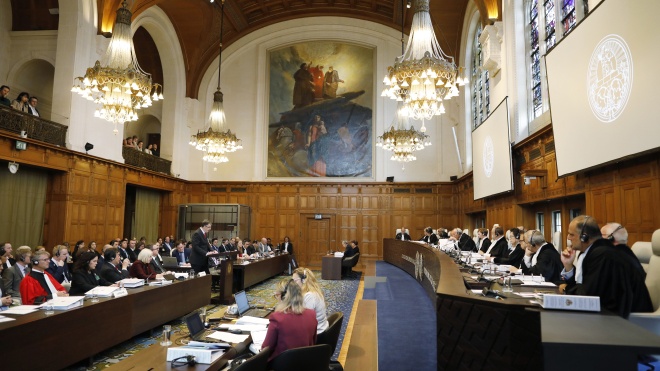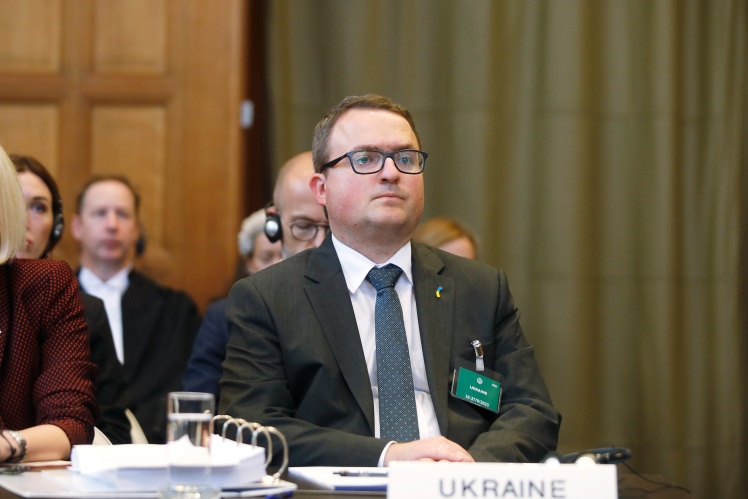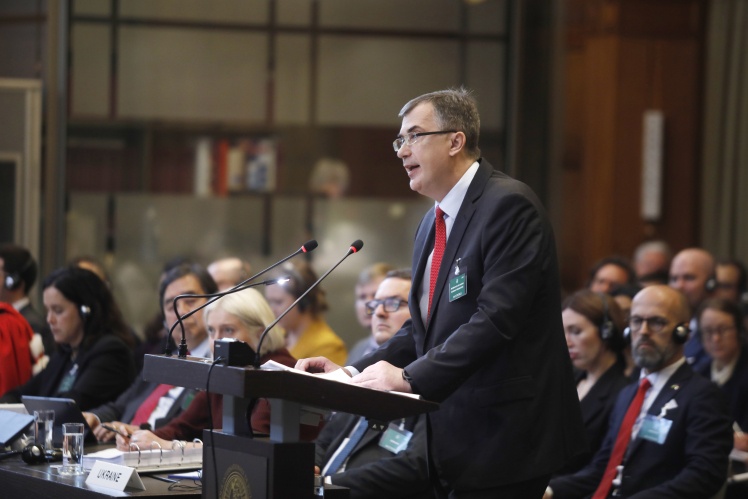What is the essence of the matter
According to international law, Russiaʼs attack on Ukraine is not a reason to complain to the UN International Court of Justice. Only violations of conventions signed by both parties can be considered there, and in which there is an article stating that any disputes are resolved by the UN court. The Convention on the Prevention of Genocide meets these requirements.
In the lawsuit, Ukraine claims that Russia incorrectly refers to the Convention on the Prevention of Genocide — abuses it when it explains its attack on Ukraine by the desire to protect the people of Donbas from "genocide committed by the Kyiv regime." Ukraine also asks the court to recognize that it did not commit any genocide in Donbas.
On March 16, 2022, the UN International Court of Justice in The Hague, at the request of Ukraine, decided that Russia should stop military operations in Ukraine until the case is considered. Russia was not present at the hearing and ignored the decision.
Later, other signatory countries of the Convention began to submit declarations of joining the Ukrainian lawsuit, a total of 33 countries. The court recognized 32 statements, but rejected the statement of the United States, because at one time it resisted the clause of the Convention on disputes in the UN court.
After the full-scale invasion, international lawyers working with Russia refused to cooperate with it. Now it is represented by lawyers from Russia, Iran and China.
Oksana Zolotaryova, Ukraineʼs co-agent in the case of Ukraine against the Russian Federation at the International Court of Justice, said in an interview with European Pravda that the team was preparing part of the lawsuit for The Hague in the evacuation train in the first days of the full-scale invasion. The other part was prepared by foreign lawyers working in the Ukrainian team. They call this lawsuit "creative."
Political positions
Russia
Gennadiy Kuzmin, ambassador-at-large of the Russian Foreign Ministry, considers Ukraineʼs legal position "hopelessly flawed", claims that it "contradicts the long-standing judicial practice of this court", and calls on the judges to close the case.
He devoted a significant part of the speech to statements about the "coup dʼétat" of 2014 and the "Nazis". As evidence, he showed slides with photographs of Ukrainian nationalist Stepan Bandera, as well as monuments to Bandera and Roman Shukhevych in Ivano-Frankivsk. He cited the statements of Ukrainian politicians taken out of context. Whether the judge believed this, we will find out later, but the journalists of various foreign media, listening to this speech, were laughing.
Ukraine
In his speech, Anton Korynevych focused on the fact that Russia violates international law, does not comply with the decisions of this court and continues to shell cities.
"You have the authority to ensure the significance of international obligations. You can rule that states that persistently abuse human rights treaties will be held accountable. You have the authority to declare that Russiaʼs actions are illegal, that its abuses must stop, that your decisions must be followed, and that Russia must compensate for the damage it has caused," Korynevych said.
Legal arguments
Russiaʼs argument No. 1
Russia denies that it invoked the Genocide Convention when it announced a full-scale invasion of Ukraine. Russian lawyers assure that Putin justified the invasion with the right of countries to self-defense.
"None of the speeches or documents expressing the official position of the Russian Federation contained references to the Genocide Convention," Kuzmin said. And Putin simply expressed "concern about the threat of genocide." Russiaʼs position is that these were just words.
The Russian delegation also proves that the investigation of the Investigative Committee of the Russian Federation against Ukrainian politicians who are allegedly "committing genocide in Donbas" does not play an important role, because the Investigative Committee does not represent Russia on the international level.
Anton Korynevych at the opening of the first round of court hearings. Gennadiy Kuzmin, authorized representative of the Russian Federation.
The International Court of Justice / "Бабель"
Counterargument of Ukraine
The Ukrainian delegation emphasizes that the Investigative Committee is a Russian state body that reports directly to the country president. And since September 2014, it has been methodically preparing the groundwork for a major invasion — it made statements about the opening of new proceedings against the Ukrainian authorities and qualified these crimes as "genocide". In 2016, the Investigator also made presentations about it in English for foreign diplomats, that is, he spoke about the genocide at the international level.
In addition, other Russian officials also declared genocide. In November 2021, the representative of Russia in the Trilateral Contact Group, Boris Gryzlov, justified Russiaʼs support for the so-called "DNR" and "LNR", referring to "Kyivʼs actions, which are aimed at escalating the conflict and actually fall under the UN Convention on the Prevention of Genocide." And this is already a statement of an international nature, because Gryzlov said it as a representative of Russia in an international group. The Ukrainian delegation cited several more statements by Russian officials, where they directly accused Ukrainian politicians of genocide and directly referred to the Convention on the Prevention of Genocide.
Russiaʼs argument No. 2
Russia said that the court should reject Ukraine because it did not comply with the rules of submitting a statement to the court. Before turning to the UN International Court of Justice, Ukraine had to notify Russia of its claims. And to go to court only if the Russian Federation refused to respond to them. The statement published by the Ukrainian Foreign Ministry regarding the accusations of genocide was released only on February 26, 2022, the day the statement was filed with the court. Russia cited several precedents when the court rejected the claim under such circumstances.
Counterargument of Ukraine
Russia could not help but know that Ukraine opposes accusations of genocide, because since 2014 Ukrainian officials have been doing it constantly. Ukrainian statements were broadcast by the media, official websites and social networks, the accusations were rejected by President Petro Poroshenko and the then Minister of Defense Valeriy Geletey. But this didnʼt stop Russia — on the contrary, there were more accusations before the full-scale invasion.
On February 23, 2022, at the meeting of the UN General Assembly, the permanent representative of the Russian Federation, Vasiliy Nebenzia, stated that the recognition of the so-called "DNR" and "LNR" was a response to the "blatant genocide" by Ukraine. The Minister of Foreign Affairs of Ukraine, Dmytro Kuleba, immediately called Russiaʼs accusations absurd.
Responding to the argument that the Ministry of Foreign Affairs published a statement only on February 26, the Ukrainian delegation noted that it was one of many statements — not the first and not the only one.
In order to prove that Russia did not respond to Ukraineʼs statement and still argues that the war was "genocide", the Ukrainian delegation cited the post of Deputy Chairman of the Security Council of the Russian Federation, ex-President Dmitriy Medvedev, which he wrote only a few weeks ago — on September 5, 2023: "In the UN Convention on the Prevention of the Crime of Genocide and its Punishment states that genocide is defined as actions committed with the intent to destroy, in whole or in part, a national, ethnic, racial or religious group as such. This is exactly what the Kyiv regime has been doing since 2014."
Members of the Ukrainian delegation.
The International Court of Justice / "Бабель"
Russiaʼs argument No. 3
Russia says that the court cannot hear the lawsuit because it is not a direct violation of the Convention on the Prevention of Genocide. That is, specifically in this lawsuit, Ukraine does not insist that Russia is committing genocide. In fact, according to the Russians, Ukraine wants the court to consider the legality of Russiaʼs invasion of Ukraine. The UN International Court of Justice is not authorized to consider such issues. In other words, Ukraine is trying to expand the courtʼs jurisdiction.
Counterargument of Ukraine
Russia violated the Genocide Convention because it manipulated the concept of genocide in order to invade the territory of Ukraine.
Russiaʼs argument No. 4
Russia insists: both countries agree that the Convention does not give the right to aggression. If so, then there is no point of dispute.
If at the same time Ukraine claims that there was no genocide in Donbas, then the Convention cannot be invoked. And on this basis, the court should refuse to consider the claim on its merits.
Counterargument of Ukraine
There is a dispute because Russia claims that Ukraine is responsible for the genocide, and Ukraine does not agree with this. Ukraine wants the court to find out whether Russia had grounds to accuse it of genocide.
In addition, justifying the attack by genocide, Russia still had to act within the limits of the UN Charter — that is, not to attack, not to commit war crimes, but to prove the fact of the genocide by legal methods.
Australian international law expert Juliet McIntyre believes that this argument of Russia is interesting, and it is difficult to predict what the court will say. According to her, the court can say that Ukraine is right, because the states are obliged to act within the limits of international law, and in this way it will assess the legality of the invasion, which is not regulated by the Genocide Convention, but by the UN Charter. Though, the court can also go the other way and say that it is not authorized to make any other conclusions about whether Russiaʼs behavior was legal.
McIntyre is surprised that Russia did not even try to provide evidence of genocide in Donbas. "Probably, the Russian Federation does not do this, because it does not have any evidence. And thatʼs why their argumentation in this part is unlikely to be successful," she believes.
Russiaʼs argument No. 5
The Russians refer to the case of the bombing of Yugoslavia. It contested NATOʼs actions, which the bloc justified by violating human rights. One of Yugoslaviaʼs arguments was that NATO, by attacking Yugoslavia, created conditions for genocide. The court then declared that it had no jurisdiction to hear Yugoslaviaʼs claim. Now the Russian delegation is using NATOʼs arguments to prove that the case has no relation to the Convention and emphasizes that Ukraineʼs claim is similar to Yugoslaviaʼs.
Members of the Russian delegation.
The International Court of Justice / "Бабель"
Counterargument of Ukraine
The Ukrainian delegation rejected this argument, because NATO countries did not use genocide as a pretext for bombing Yugoslavia. Therefore, the example of the Russian delegation is irrelevant.
And the last thing that the Russian delegation kept silent about. All this time, Russia is not complying with the decision of the UN International Court of Justice, which it issued in March 2022 on the cessation of hostilities. The court has considered this issue and decided that it therefore has jurisdiction to hear this claim.
Why is it important that 32 countries supported Ukraine?
First, it is political support. According to McIntyre, this can convince the rest of the international community that Ukraine is right.
Secondly, the countries that appealed to the court are participants and co-authors of the Convention on the Prevention of Genocide. They may influence the interpretation of the Convention. And when they say that this case is different from others, and the court has to hear it, it is more difficult for the court to say that the case is beyond its jurisdiction.
Whatʼs next?
On September 25, 2023, the second round of arguments and counterarguments began. The court will then decide whether it has jurisdiction over the merits of the dispute. If it does, the parties will exchange memoranda, and after some time the hearing will begin. It is not known when exactly the court will make a decision. It usually takes at least a few months, so it should come not earlier than December 2023.
"The probability that the court will proceed with the case is 90% or more, and there will probably be several separate opinions of the judges," says Juliet McIntyre. She says that Ukraineʼs arguments are quite convincing, and the Russian presentation contains many points that do not really relate to the essence of the case.
Members of the court during the opening of court sessions.
The International Court of Justice / "Бабель"
Translated from Ukrainian by Anton Semyzhenko.
Fair courts and independent media are the basis of democracy. The court in The Hague is financed by half of the world, and only you help us. Support Babel: 🔸 in hryvnia, 🔸 in cryptocurrency, 🔸 Patreon, 🔸 PayPal: [email protected]


